Experience in Generic Role-playing Games
Most games immediately after D&D were about the rules. Even games such as Chivalry & Sorcery and Gamma World postulated basic, generic worlds for their genres. In this “first wave” of RPGs, designers spoke of concern for “playability” and “realism”. The goal was to create “better rules”, however the designers defined “better”. Playability generally meant simplicity and, to a lesser extent, balance. Realism could be real-world realism or genre realism. Even games as simple and abstract as Tunnels & Trolls altered their rules in later editions to lend more “realism” to play.
Many adventures during this era contained statistics for multiple games. So, for example, one of the adventures that comes with Mercenaries, Spies, and Private Eyes (from Blade) also contained statistics for playing the adventure with Hero’s Espionage. Superhero adventures such as Wings of the Valkyrie contained statistics for both Villains & Vigilantes and Champions.
Tunnels & Trolls
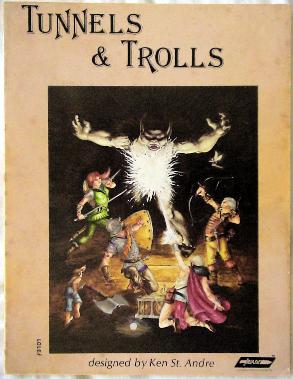
In 1973, Dungeons & Dragons spread like wildfire through the midwest and the college circuit. Two years later, Ken St. Andre published Tunnels & Trolls through Blade. In many ways, Tunnels & Trolls was very similar to D&D. In some ways, it was extraordinarily different. Where D&D was about individuals, T&T was about groups. I’ll be discussing the fifth edition, because that is the edition I have; it is also the most common edition, lasting from 1979 to the 21st century.
How does a character gain Experience/Adventure Points? He or she must participate in something that can reasonably be called an adventure, monitored by a GM.
Characters in Tunnels & Trolls gained “Adventure Points” for Daring, Combat, Saving Rolls, and Casting Magic. “Daring” could be easily determined, for underground adventures, by the level of the dungeon that the characters reached. But any daring actions deserved reward:
Under this category there are experience points for doing something unusual, even foolhardy. If a character walks into a dragon’s lair to suggest a riddling contest for safe passage through the room, he should be given some small reward for trying it. He’s taken his life in his hands, not knowing if the dragon will flame first and ask questions later.
Combat experience matched the games focus on group play, and stated specifically that “any character who participates” shares equally in the adventure points gained. Saving roll experience was awarded to the character making the save; characters received more experience for rolling well and more experience for tougher saving rolls. Casting spells resulted in small amounts of experience as well; the more taxing the spell, the more experience the character gained. These three types of experience awards were awarded immediately.
The game master also could award adventure points for any action, such as solving puzzles or otherwise figuring things out. Any awards outside of the normal, however, should be for “those players who are doing an exceptionally good job only, thus making the game more of a challenge to all.”
Older versions of the game awarded experience for treasure and magical items, just as D&D did. By fifth edition treasure was no longer a source of experience awards.
Adventure Points increased the character’s level, which in turn increased the character’s attributes. Each successive level brought successively greater increases to attributes. Beyond attribute increase, however, level did not directly affect a character’s dice rolls. For spellcasters, character level did affect the power of spells that they could easily cast.
Watching your characters grow and prosper is one of the major pleasures of this game.… T&T is a game of growth as well as destruction (although occasionally growth by destruction) and it is hoped that as your paper alter-egos grow in power and wisdom, so, too, will you.
Mercenaries, Spies, and Private Eyes
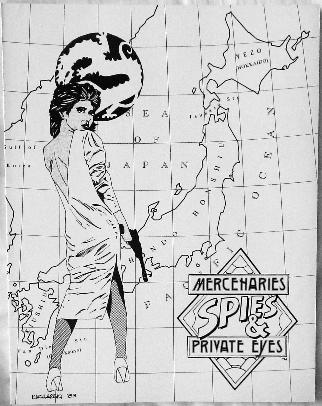
MSPE, introduced in 1983, was Tunnels & Trolls for modern pulp fiction. The experience point system remained nearly exactly the same. The main difference was that, instead of a list of improvements a character could gain when advancing a level, the player was allotted two points with which to increase one or two of the character’s attributes.
MSPE added skills to the Tunnels & Trolls ruleset, and each skill maintained its own separate Adventure Point total. When used during the game, the skill gained adventure points, and the skill “leveled up” in the same way that the character did.
Traveller
Traveller came out in 1977, following only D&D and Tunnels & Trolls as its major RPG predecessors. Traveller used a life-path character creation system. Character creation is a game. Whether it’s the luck-of-the-draw combined with life choices seen in D&D, T&T, or Basic Role-Playing; or the calculation-intensive creation seen in Champions, creating characters is a game within the game. If the creation mechanics coincide with your own inclinations, character generation can even be more fun than the game. I still enjoy creating characters for Men & Supermen, even though I’m not likely to play it again for a long while.
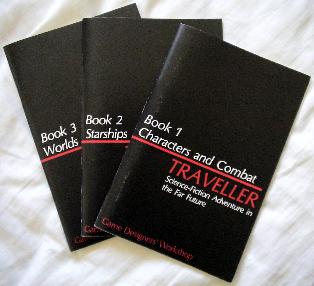
Traveller was the first RPG I’m aware of that took the game of character generation so far that you ran the risk of your character dying before you had a chance to play it.
The Traveller character creation system and its character improvement system mirror the game rules from GDW’s earlier (1975) En Garde! In En Garde! the entire game was played out in months, until it came time to duel. In each month, the players wrote down very specific actions, such as practicing with their weapon, carousing, or wooing a mistress. En Garde! was a cross between a board game and a role-playing game.
In Traveller, there were no experience points or anything like them for character advancement.
The experience which is gained as the individual character travels and adventures is, in a very real sense, an increased ability to play the role which he has assumed.
Besides acquiring equipment through purchase or looting, if a character wanted to increase their capabilities they needed to, basically, go to college. The character had to “devote himself to a four-year program of self improvement”. The player had to roll 8 or greater on 2d6; a failure meant that the character did not dedicate themselves enough to the improvement regimen and did not gain the bonus.
- Characters could increase their general education characteristic, if that characteristic were lower than their intelligence characteristic. Fifty one-week sessions raised the character’s education by one point; the sessions could be carried out by correspondence course or tutor, costing 50 credits per week.
- Characters could increase their weapon expertise in two specific weapons at a time. The character’s skill in that weapon increased by one point for the duration of the four-year training period, but was not permanent unless the character “continued formally for another four years”. If the “dedication” roll failed in the second four-year period, the increase was lost.
- Characters could increase up to two skills at a time in exactly the same manner as for weapon expertise.
- Characters could undertake a physical conditioning regimen; for the duration of the regimen, the character’s physical characteristics (strength, endurance, and dexterity) increased by one, and dropped back when the character left off the regimen. This was the only training program that allowed for a bonus to the dedication roll: characters of low intelligence were more likely to successfully dedicate themselves to a physical conditioning regimen.
The rulebook also noted alternatives to time and study, but these were not detailed:
The above is the only ordinary method of self-improvement available to characters. Highly scientific or esoteric methods of improving personal skills and characteristics are logically available, provided the individuals search hard enough for them. Such methods could include RNA intelligence or education implants, surgical alteration, military or mercenary training, and other systems. Alternatives to the above methods must be administered by the referee.
Dianetics in Space
One of these “esoteric methods” was detailed in Book 3: Worlds and Adventures. If the character could find them, the “Psionics Institute” would for 5,000 credits examine any character and measure their “personal psionic strength”. Once a character’s psionic strength were known, the institute would happily train them for 100,000 credits.
Characters had a psionic strength of between 0 and 11: each four years of life beyond age 18 reduced the 2d6 roll by one, so that all rolls were at a penalty of at least one. The older they were when they took the test, the less likely they were to have any psionic strength at all.
Psionic abilities (such as telepathy, telekinesis, and teleportation) started at 1 and could be increased on a monthly basis; each month, the player had to roll 2d6 and beat either 8, 10, or 12 depending on the psionic ability. If successful, the character’s level in that ability increased by 1, up to a maximum of their psionic strength.
Chivalry & Sorcery

In 1977, Fantasy Games Unlimited published Ed Simbalist’s and Wilf Backhaus’s Chivalry & Sorcery. Where Tunnels & Trolls simplified Dungeons & Dragons, Chivalry & Sorcery made it more realistic. Part of that realism was more randomness. Players even needed to roll for their birth horoscope; their horoscope affected their experience point gain by anywhere from a 25% bonus to a 5% penalty.
Like the rest of the game’s rules, experience points were basically that of original D&D but more complex. The influence of treasure was significantly reduced. First, it retained the use of gold pieces to measure experience but in Chivalry & Sorcery gold pieces were rarer than D&D. “Even a few hundred silver pieces are a substantial amount of wealth.” Second, most character classes gained only 10% to 25% of their loot (measured in gold pieces) as experience points. Dwarves, Thieves, and monsters gained 100% of their loot as experience. Clerics gained experience for gold only if they donated it to the Church.
The award of different experience point totals to different classes also followed through to “slaying and vanquishing enemies”. Fighting Men gained 100% of a creature’s experience award for slaying them; Clerics 50%; Magick-Users 10%; and Thieves according to whether they killed in a sneak attack or a frontal attack.
Characters gained experience for existing, and the more their day-to-day activities matched their class, the more experience they gained for existing. Knights and Fighting Men, for example, gained 1 point per level per day simply for being a warrior; they gained two points per level per day for going on an adventure, and three points per level per day for going to war.
Depending on their class, characters could gain experience for gallant deeds, rescuing noble damsels in distress (fewer points for non-noble damsels), doing good works, raising demons, or undetected burglaries.
Experience points increased the character’s experience level. New levels brought a better ability to fight. Magick-Users had a separate table relating experience points to arcane abilities.
Chivalry & Sorcery solved the problem of how to divide experience after a group combat by offering the players two choices. If they chose “The Road to Glory” experience was awarded according to a character’s contribution:
- If single combat, all points are awarded to the victor.
- If multiple combat, points are shared equally among the participants in the combat, with 1/2 of a share to those who did not participate but performed duties necessary to the success of the combat or the safety of the party, such as holding torches, guarding the rear, etc.
If the players chose “The Company of Brothers”, on the other hand, experience was “awarded equally for all monsters slain or vanquished, and all loot is shared equally after expenses are settled.”
Knights and Fighting Men also gained honour for some actions. Honour points increased their influence, which allowed them to call on others (usually nobles or other political figures) for favours. A character’s influence depended on their charisma, social status, experience level, and honour points. Honour points were a bit like experience points: every hundred points increased a character’s status by one, and once gained they were permanent.
Gamma World
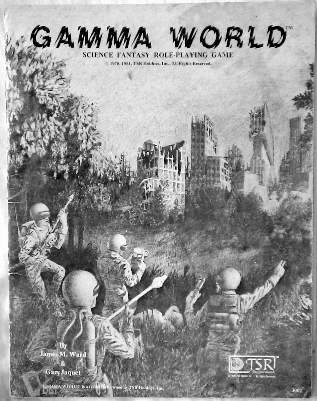
Gamma World was a 1978 post-apocalyptic role-playing game from TSR; in many ways it resembled D&D but experience points mattered much less in Gamma World. Advancement in Gamma World was almost entirely the result of finding powerful artifacts in the ruins of the old world.
Determining how to work these artifacts was a game in itself, which could easily result in a character’s death. There were special flowcharts for determining how to work artifacts. Players rolled dice to go from place to place on the flowchart until they either hurt themselves, gave up, or solved the operational puzzle.
Besides gaining stuff and learning how to use it, characters could increase in level by gaining experience points. Characters gained experience points in these ways:
- for combat, award of experience points was equal to the number of hit points of any hostile being or creature killed or subdued in combat,
- for acquiring items of value and artifacts, a number of experience points was awarded equal to the value of the item in gold pieces, or for the assigned experience value of artifacts, and
- experience was awarded to an individual or an entire party by the referee for outstanding actions.
Combat experience was “divided equally among all participants”. For valuable items found, stolen, or “otherwise acquired during the course of an adventure” the character who acquired it gained the experience, and experience was only gained for artifacts and devices after the character figured out what it was.
Gaining a level did not mean a general increase in combat effectiveness as in D&D. The player rolled a d10 and their character gained a +1 either to one of their basic attributes (mental strength, constitution, dexterity, charisma, physical strength, intelligence), to their “to hit” roll in combat, or to each die of damage caused by non-energy weapons.
Runequest
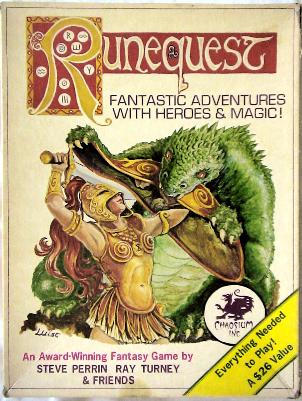
The March/April 1979 issue (issue 10) of Judges Guild’s Dungeoneer contained a review by Paul Jaquays of the new Runequest game.
The second anomaly that may be discovered is the lack of structured “levels” of experience. A character starts out as an adventurer with little or no trained skill and only his native ability. But by increasing his power and other abilities in magic use, combat, stealthfulness and instruction, a character may become a Rune Lord, Hero, or even a Superhero.
The first shocking situation that a traditionalist role-playing gamer may discover is that there are no “classes”. That is to say that there are no distinct fighters, magic users, clerics, thieves or assassins. A character may become, one, any or all of the above, limited only by his desire, cash flow and bad dice rolls. Each skill within a certain discipline, such as magic, thieving or fighting, is learnable in percentage increases by paying so much coinage to an approved instructor (or by learning from experience in a stress situation.) to learn or improve a desired skill.
RuneQuest came with a world, but the rules didn’t require it. Even the references to Rune Lords and Rune Priests, while very Gloranthan, were kept as much out of the rules as possible.
This game is not limited to Glorantha. The experience system, the combat system, most of the magic system, and the training/guilds system, and everything but the specific references to the world of Glorantha can be adjusted to fit any time and space with a minimum of hassle. We think you will find this system more realistic, and at the same time more playable, than any system you have seen before.
One of the major ways for a character to advance in RuneQuest, however, was, if not tied to Glorantha, at least very much like it:
A surviving Adventurer gains experience in fighting, magic, and other skills, as well as money to purchase further training.
The Adventurer progresses in this way until he is so proficient that he comes to the attention of the High Priests, sages, and gods. At this point he has the option to join a Rune cult. Joining such a cult gives him many advantages, not the least of which is aid from the god of the cult.
Acquiring a Rune by joining such a cult is the goal of the game, for only in gathering a Rune may a character take the next step, up into the ranks of Hero, and perhaps Superhero.
Many of the skills in RuneQuest improved if the skills were used. Defense, for example, improved when it made a difference. A character’s defense decreased their chance of being hit in combat. If their defense made a difference (that is, without it they would have been hit), the player made a roll against Intelligence (normally 1 to 20) on d100; if successful, the character’s defense went up by five points.
Characters could train in physical characteristics (Strength, Constitution, and Dexterity) but not mental characteristics. Increasing physical characteristics cost time and money.
Characters gained fighting skills in a similar manner. Characters could “buy” training in 5% increments, up to 25% (for those with exceptional characteristics such that their natural ability was already 25% or more in a skill, training sufficient for a one-time increase of 5% could be paid for). The guilds that offered this training would generally do so on credit (to a limit based on the character’s relevant ability) and this would leave the character indebted to that guild.
Characters could also increase their fighting skills by successfully using them. If, during an adventure, the character successfully used any weapon in an attack, or weapon or shield in a parry, the character might be able to “relax and meditate upon his experience”. This required a week, so it generally occurred after the “scenario”, or adventure, had been completed. The chance to increase the skill by 5% was basically 100% minus the current success chance. Characters with higher Intelligence had better chances.
Characters could also increase their skill further by training if they used it successfully during the adventure. The limit on increases either by using or by training were 5% each (for a total of 10% possible) between adventures.
Characters who reached a 90% in any weapon could teach it to others.
All characters in RuneQuest also had the basic ability to perform magic. Their strength was tied to their Power characteristic and the number of spells they could use was limited by their Intelligence. Learning spells cost time and money. They were taught by the various Rune cults.
Power was a very useful characteristic in RuneQuest. It was used to resist spells. Spell use reduced it, making the spellcaster more vulnerable to other spells. Increasing it required that it be used “in situations of stress.”
A character cannot attract POW from the Universe without the high emotional output found in the midst of battle. This emotional output is not found in throwing spells at a friend who attempts to resist them, or similar “training” situations.
Power was increased in much the same way as other skills used: at the end of the adventure, if the character had successfully “overcome an enemy’s resistance with a spell” during the adventure, the player could roll against a percentage. If successful, the character would gain one to three Power points depending on a second roll’s result.
RuneQuest characters could learn and perform other skills besides combat skills. For some skills, all characters had a basic chance to perform them. For others, the character needed to learn the skill before having any chance of success.
As long as the character had a chance of success, increasing a skill used the same rules as for increasing fighting skills: on a successful use, the player made a d100 roll against 100 minus the current skill percentage. If successful, the skill advanced 5 points. The character could also buy training with time and money. This was required, at least at the start, for skills that had a 0% base chance.
Skills, whether fighting or not, were limited to 100%: the character could never, through either experience or training, increase a skill beyond 100%. A character with a 100% fighting skill could attack two opponents (at 50% each) at a time.
Those advancements and restrictions were for character ability, however. The purpose of RuneQuest characters was to learn Runes. Once characters had enough money, Power, and/or Charisma, they could request to become initiates to a cult. The character must already have been a worshiper of the cult’s god, have sworn allegiance to the god (through the cult’s priests), and have taken part in cult activities.
As an initiate, the character gained limited access to Rune magic. Some cults might also have special cult skills and spells which their initiates could buy training in.
The next step for an initiate was to become a Rune Lord. The character needed at least 90% in at least five skills. Some cults had specific requirements for specific skills or kinds of skills. The character also needed a Power of at least 15, “enough POW to attract a god’s attention.” And the character needed to have been an initiate for at least one year.
Rune Lords could increase skills beyond 100%. While characters would always fail on a 96 to 100 roll, skills beyond 100% meant that Rune Lords could perform otherwise impossible tasks. Also, a Rune Lord with a 150% or more fighting skill could attack three opponents at once, at (at least) 50% each.
Rune Lords also gained even greater magical abilities, such as a near 100% chance of divine intervention, creating a spirit weapon, creating Rune metals, and the ability to resist magic as effectively after casting spells as before.
The Rune Lord also acquired more responsibilities in the cult, including supporting it with “90% of his income, and all magical items he cannot use personally”. Donations did, however, count towards the costs for training and spells.
An initiate with a power of 18 or more could petition to become a Rune Priest. Rune Priests gained access to spirits, just as Rune Lords did, but also to Rune Magic. They also were more easily able to increase their Power after a successful use. Rune Priests also had responsibilities, very similar to Rune Lords. One of these was that their duty had “no time for the intense training necessary to maintain DEX based skills such as fighting.” Their Dexterity-based skills dropped to a lower (but relatively high) percentage if they had a high percentage.
Rune Priests were not allowed to train in any skills, but they could increase their skills (even their Dexterity-based skills) through experience.
While a character could progress to both Rune Lord and Rune Priest in any order, if possible it made more sense to become a Rune Lord first: Rune Lords who became Rune Priests did not suffer a loss of skill.
All in all, character advancement in RuneQuest required more record-keeping on the player’s part than other games. But it also encouraged the player to have their character do things “on screen” if they wanted their character to get better at it. Training was expensive and time-consuming. Gaining through use was cheap (if unreliable) and involved a certain amount of player skill choosing the appropriate times to use the skill.
Basic Role-Playing
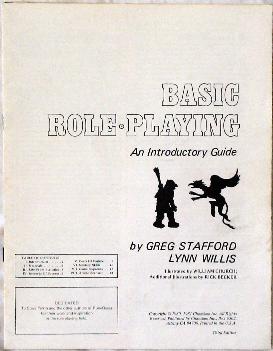
Basic Role-Playing, by Greg Stafford and Lynn Willis (1980) is a simplified form of the RuneQuest rules. It became the basis for many Chaosium games. I’ll be looking at one of them, Call of Cthulhu, in Experience in World-Based Role-Playing Games.
Basic Role-Playing noted a much more abstract reward for players and characters. In the fairly standard section describing what role-playing is, they wrote about the greater rewards of success and glory:
Winning in such a situation depends on whether or not the player characters succeed in their goal.… The only real losers are those characters—not players—who die in the attempt. Even then there is the satisfaction in dying gloriously, and recounting such a deed of honor.
…Possibility of loss makes success rewarding. Commit your characters to battle and play without restraint.
Committing characters to battle was even more important in Basic Role-Playing because it was the only way to increase the character’s skills. Skills increased only if they were used successfully during an adventure, and the more skilled a character was the harder it was to increase that skill. It used a simplified version of the RuneQuest rule: “after play is done and before everyone goes home”, the player checked each skill that was used during play. Subtract the current skill from 100. If the player rolled d100 less than that number the skill improved by 5 percentage points.
As Reeve Holmsman said in the “Military Skills” section, “I can teach you, but you’ll have to do the learning.”
Bob Albrecht’s and Greg Stafford’s “Adventurers Handbook” in 1984 used Basic Role-Playing as its example system, and said this about experience:
As a character goes from adventure to adventure, he or she can learn from experience or, if successful in acquiring things of value, can buy formal training. If you play your character skillfully (and have a little good luck), your character will grow, learn, and generally get better at whatever he or she tries to do in the game master’s world.
Villains and Vigilantes
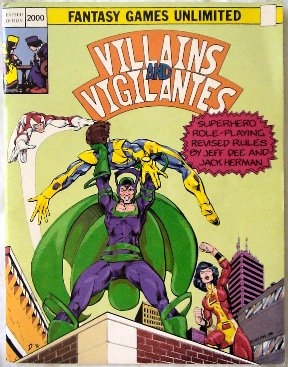
For a while, Jeff Dee’s 1979 Villains and Vigilantes was the most popular superhero role-playing game. It was a relatively simple game, compared both to other offerings by Fantasy Games Unlimited and the superhero games that followed it.
In V&V, characters improved thru the acquisition of Experience points and Charisma points. Experience point acquisition was very simple and very comic book:
Opponents (villains) captured and taken to the authorities are worth a certain number of experience points to the player(s) who defeated them. Fighting other heroes earns a player no experience points, nor does he receive any for villains whom he fails to capture. Opponents killed are worth no experience in most cases, unless the GM agrees that the act was absolutely necessary or unavoidable.
Opponents were worth an experience total equal to the sum of their characteristics (agility, strength, intelligence, endurance) and hit points, times the opponent’s experience level.
Players can also acquire experience points by donating money to charitable organizations (not including other player characters). For every ten dollars donated, one experience point is gained. Only money a player actually earned can be donated for experience (i.e. gifts or discovered treasures don’t count).
What this meant in practice is that villains were also worth up to a tenth of the reward for capturing them, if the hero could collect. Heroes were not allowed to gain experience by donating the proceeds of merchandising, and each dollar acquired through merchandising created a “one dollar buffer against the benefits of future donations”.
GMs could also award no more than 500 “extra experience points to characters who showed outstanding ingenuity, etc., or who simply lived through an event incredible enough to merit additional points from experiencing it.”
“The purpose of accumulating experience points is to be able to attain a higher Experience Level.” On attaining a level (much as in Tunnels & Trolls), the player could choose from a list of bonuses, such as +1 to a characteristic score, +1 to combat accuracy with a specific weapon or attack, +1 to combat damage caused by the player with a specific weapon or attack, an education skill area, or “whatever… seems reasonable”.
The player automatically received improved overall combat accuracy with each level increase. Higher level heroes were more likely to “hit” lower level opponents. The player’s security clearance, if the player had one, improved, their salary increased if the player “was receiving pay as a superhero”.
And the character gained Inventing Points that they could use to “construct devices to supplement their normal powers to aid in accomplishing a particular task”. Inventing Points were Brilliant Ideas necessary “in creating scientific breakthroughs”. They might be used to create a one-shot device for defeating a powerful villain, or for creating permanent new equipment “about one-quarter to one-third as powerful as any power they mimic”. Beyond that, the invention process was left largely to the GM and the players.
Oddly, the ability to lose weight is also tied to the character’s level. On gaining a new level, one of the benefits is “lose weight” (which increases the character’s strength and/or endurance). The chance of successfully doing so goes up as the character increases in level.
A player’s charisma also increased (or decreased) throughout the adventures. At the end of each session, the GM awarded charisma bonuses and penalties “based on the events of that session”. The character needed to make a d20 roll against their charisma for charisma points (bonuses or penalties) to take effect. Characters with higher charisma were less likely to be able to take advantage of charisma awards. Characters with lower charisma were less likely to have to accept charisma penalties.
Players could also gain charisma awards by donating money: each $1,000 donated meant one charisma point, subject to the above d20 roll. Players could donate money to either receive experience awards or charisma awards, but the same money couldn’t be applied to both. Money from merchandising could improve a character’s charisma, but only if “announced in advance” and donated “immediately upon receipt of the cash”.
DragonQuest
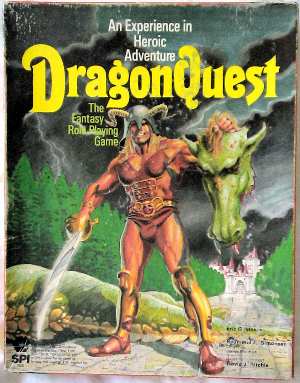
DragonQuest, from 1980, was an interesting fantasy game from SPI with a very clear rules breakdown. Each section was numbered and each rule was given a subsection within the section. Sections 86.1 through 87.7 described how experience points were gained and used.
As in most games, DragonQuest characters could improve their capabilities by purchasing equipment as they gained more money. One of the interesting parts of the game was section 79.4, the “standard Adventurers’ Guild contract”. The contract spelled out exactly how treasure would be distributed among signatories. The Guild was a powerful organization in an otherwise generic game. It enforced its contract on all members, even standing in for dead members.
DragonQuest characters gained experience points that they could trade in for various skill and characteristic increases. “A character’s progress in his trade is measured in Experience Points, which are gained at the conclusion of an adventure and as a result of constant practice.”
As in RuneQuest, any DragonQuest character could learn magic; it was assumed that all but a few started the game in one magical college. Each skill had a rank. A chart in the back of the book correlated experience point allocation to skill rank; characteristics could be increased as well. Most skills and characteristics had a high initial experience point cost, and then a smaller cost to increase further.
Spells each had a rank that could be increased through experience point expenditure. Unlike Runequest, in which the capability with a spell depended on characteristics (usually Power), or D&D in which capability depended on an overall magic-user level, DragonQuest characters increased each spell separately. Characters gained some spells automatically for being in the college. Others, they could purchase through experience point expenditure.
Each characteristic, skill, or spell required the use of time and/or money as well as experience points to gain and increase.
Players gained experience points for their characters by playing the game. Approximately every five hours, the characters gained a base amount of experience points. This base amount increased if the character had “at least ten abilities Ranked 4 or greater” and increased even more if the character had “at least ten abilities Ranked 8 or greater.”
The base award was doubled “if the mission of his party succeeds” (section 86.2). It also increased by 10% for each time the character was in “immediate danger of dying” during the adventure, up to a maximum of 30% (section 86.3).
Immediate danger is defined as any time the average result of an attack by an opponent who still lives will kill the character. A character cannot receive this bonus more than once in the same combat.
Characters also gained (or lost) 10% to 30% of their experience award depending on how well the player acted the role of their character and how well or poorly the player made decisions for their character.
The character will gain EP as the player adds a new dimension to his personality, or when the character takes an action of note (which may be to the detriment of the party) which illustrates a facet of his personality. The character will lose Experience Points when the player has him perform actions which are inconsistent with his personality.
The character will gain EP if the player plays the game well or solves a problem, and will lose EP if the player blunders.
Characters could also gain relatively low experience points awards per day of practice while not adventuring.
The Game Master was “the sole dispenser of Experience Points”.
Space Opera
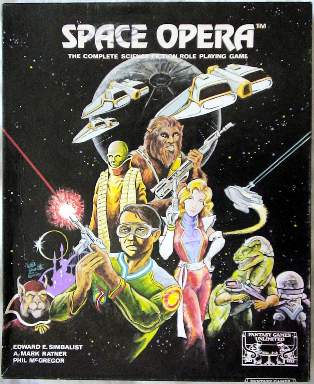
Where Chivalry & Sorcery took D&D and made it more complex, Fantasy Games Unlimited’s 1980 Space Opera took Traveller and made it more complex.
Space Opera is not an easy game. The individual systems are actually fairly simple and quite logical, but the sheer number of systems can be staggering.
Character advancement was partially up to the player. Players were encouraged to define goals and end-points for their characters, after which the character might “retire”.
…there are never any victory conditions set in a role game any more than there are any clear victory conditions set in real life. When does a man win? Whenever he attains his life’s desire or, at least, has a good, exciting, fulfilling run for his money. When does a man lose? Whenever he fails to use his talents and brains to take advantage of opportunity.
Each player will have his own idea of what it means for his PC to ‘win’ or ‘lose.’ The player must decide for himself. If he aims at making Admiral in the StarForce, that is the chief priority in his PC’s life, and the PC will conduct himself accordingly. If it is to have his own StarShip and to set out on the life of a Free Trader, well and fine. But there will be no ‘easy’ measures of superficial ‘success’ like experience points and experience levels. Success is something that satisfies a person at the moment.…
We suggest that players try to get rid of the hyper-competitive spirit that marks some kinds of role gaming. The measure of a character is whether or not the player gets him to the goal that the player/character sets for himself. Then, having attained that goal, the way is opened to ‘retire’ from the game and start a new character as replacement or to seek still greater goals.
One wins in role-play in the manner that one ‘wins’ in life—you get to where you were going.
As in Traveller, characters began the game after several tours of duty in some government or private service. This pre-game education and training provided the player with “skill points” which the player would then use to purchase fields of knowledge and skill areas. This was the final step of the character creation game.
True to their introductory remarks, there was a different system for acquiring skills after role play started.
Study is required in most instances. Study involves the expenditure of time and the availability of appropriate facilities, learning equipment, materials, and sometimes instruction by an expert in the chosen study area.
The chance of success with a trainer or training program was (40+IS+PCA)/(EL+3). IS (instructor skill) was ten times the instructor’s skill level. The instructor’s skill was penalized if the class size exceeded the instructor’s empathy score. PCA was the character’s aptitude. Aptitude was found by cross-referencing the appropriate personal characteristic to a chart. EL was the expertise level to be acquired in the skill.
Each skill had a basic learning period. After that period, the player rolled a percentage chance “to see if he has learned the subject.” Characters could increase the chance by 10 points for each extra learning period that the character engaged in study or training, up to a maximum of +50. Whatever their total time spent training, if the player failed the roll, they could have the character spend half that time for another chance. After the second chance, any further attempts to learn would require waiting the full time—apparently including an “extra” time that the character studied to increase their chance of success.
The chance of success when “attempting to learn a skill by himself” was (40+PCA+Intelligence+Intuition)/(EL+1). Characters could gain a bonus equal to half their intelligence for each extra week spent studying, up to a maximum of +50.
The rules recommended that the game master make that learning roll secretly, milking the success or failure of the roll for its “dramatic potential”.
As in Traveller, another means of increasing character capability was to awaken psionic talents. “No character will enter the game psionically ‘awakened’” but could (if their Psionics characteristic was high enough) become awakened during play. There were three means of awakening latent psionic talents:
- Direct exposure to “some form of psionic attack”.
- Exposure to an “unsensitized PK Crystal which has come into the PC’s possession.”
- Characters with exceptionally high Psionics scores might be “contacted” and would then disappear “for a period of 3 + 1d6 weeks” returning psionically awake and refusing to tell where they’ve been (or lying). This chance was checked once per year—including years spent in pre-game character creation. If contacted during the pre-game period, “such characters, unlike all others, will emerge in the game with active psionic talents.”
Once awakened, the character gained one psionic talent and learned others in the same manner as learning skills.
Champions
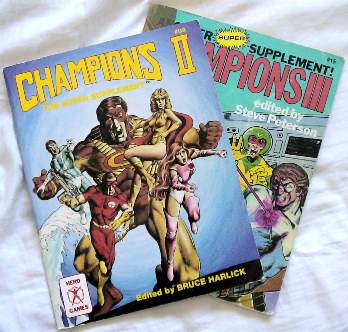
Champions, in 1981, was the first major role-playing game to remove dice rolling from everything to do with character creation. The group decided on a point level for the game (usually 100 points) and the players gained this many character points to build each character. Every characteristic, skill, perk, talent, and power cost a certain number of points. Powers themselves were built from their effects, with each power advantage adding to the point cost for the power.
Powers could have limitations, to reduce their point cost. Characters could have disadvantages, which gave them more points to build from.
Champions broke with tradition in another, very important way. While point-like, classless systems had been burbling up from the home rule underground for a few years, Champions required that everything about the character be paid for in character points. When Champions II introduced salaries, they were pure flash; they had to make sense given the character’s profession and skill in that profession, but a “disgustingly rich” salary didn’t cost any more than a “poor” salary. The character’s salary didn’t matter for anything that could be bought with character points. Discussing the “confusion about what can be bought with money, and what has to be bought with points”, Champions II said:
Anything that can be bought with points, should be bought with points. The GM may well decide to let characters own a car or a gun without paying points for it, and this is fine as long as the object in question rarely comes into combat. However, if the character plans to use his pistol as a superhero, he should pay the points for it.
A Champions character might be able to pick up a rifle from the battlefield and use it once, but if the player wanted that character to keep the rifle for later use, they needed to pay for it in character points. Even allies, other than player characters, had to be paid for if they were to be relied upon.
This restriction worked well in the superhero genre, where (at least at the time Champions was written) superheroes rarely loaded themselves up with weapons other than the weapons they began their career with. Even when it would have been useful, Captain America pretty much never picked up a firearm. And despite the potential for great wealth, Peter Parker never cashed in on his web-fluid invention.
When the various Champions-like games from Hero Games were combined into a “universal” rule set called the Hero System, this restriction was removed for non-superhero genres of that system. It was explicitly retained for the Superhero genre, however.
Characters can own vehicles and bases. In heroic campaigns, the characters should pay for these with money. In a superheroic campaign the character must pay Character Points, just like all other equipment. (Champions IV, p. 45)
In a superheroic campaign, characters will have to pay Character Points for any weapons they possess. They cannot easily change weapons, since the “weapons” are just the special effect of some power. Additionally, a character cannot buy a weapon with money and then regularly use it—unless he’s willing to pay the Character Points for the weapon. (Champions IV, p.198)
This meant formulating a character concept. Character points were rare once character creation was completed. In Champions, every ability that the character had, whether internal or external, had to be carefully accounted for as part of the character concept.
After the game started, characters gained experience points. The experience point award depended on the length of the adventure, the difficulty of the adventure, and how well the players played their characters. Where a character was usually created using 100 character points, an adventure would give one to six experience points.
Experience points were used in the same way as character points: improving existing capabilities or gaining new capabilities cost the same number of experience points after the game started as they would have cost in character points during character creation. Players could also “buy off” their character’s limitations and disadvantages as the game progressed, if they allotted experience points to replacing the points gained from those limitations and disadvantages.
Major changes, such as removing a disadvantage, required some in-game reason. For example, “if a character was Hunted by the FBI, the GM could have a run where the PC proves his innocence, or the FBI finds that it is following the wrong suspect.”
Minor changes generally required learning between adventures but the points could also be spent during an adventure.
A character usually spend Experience points between adventures. However, the GM may allow a character to learn a new skill during an adventure. For example, Randall could “just figure out” how to fly a DC 3 as it’s spiraling downward into the ocean. Some skills may require a fair amount of time in the campaign to learn, while others would require that the character be trained under an instructor. The character may have to go off the beaten path to find a teacher in some of the more esoteric Skills or Talents.
In general, it was the point total that mattered. Players could work with the game master to alter their disadvantages as the game progressed, as long as the point total remained the same. They could even, if they saved up 25 or so experience points, ask their game master for a “radiation accident” and not only gain new powers with those points but alter their existing powers. Again, it didn’t really matter as long as it made vague sense within the game and the point cost was the same.
For large purchases, groups could pool their experience points. A superhero group might pool their experience points to create expensive items such as bases or vehicles, for example.
Star Frontiers
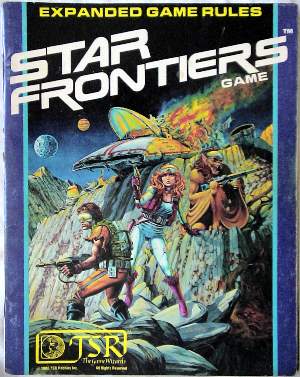
Unlike Gamma World and Gangbusters, Star Frontiers (which came out in 1982, the same year as Gangbusters) did not use levels. Its use of experience points was more like character points in other games. Abilities were basically on a 1 to 100 scale. One experience point could increase an ability by one point. A new skill cost three to ten experience points. This gave the character a bonus of 10 (usually) on rolls involving that skill. However much the skill cost, that same number of experience points would add another bonus of 10 (usually) to the character’s rolls.
Characters gained experience points for completing the goals of an adventure. They gained more experience the more they contributed “to the group’s success.” Characters gained one to three experience points per goal, and the rules recommended “about 3 to 7 XP each during an average evening of play.”
Palladium Fantasy
Kevin Siembieda’s Palladium Fantasy was introduced in 1983; the system originally appeared in The Mechanoid Invasion in 1981 and later spawned quite a few different games based on it. I’ve pulled most of this information from Erick Wujcik’s 2001 After the Bomb, but have verified that it matches the 1983 edition of the Palladium Fantasy system.
Palladium Fantasy used an experience point system with levels. In the paragraph about how “there is no winner in a role-playing game”, Siembieda writes:
If a character survives and meets with success in his endeavors, that is winning. However, there are rewards besides the acquisition of material goods and reputation, and those are developing your character’s skills, knowledge, and abilities. This is accomplished through the gathering of experience points.
Siembieda used general experience points because he found them “extremely realistic and practical”.
Training is useful, but there is no substitute for experience. I don’t know how many times I have read a comic book with the main character thinking to himself something like “Only my years of experience enabled me to beat him,” or “H’s good, but lacked the years of experience and training to handle the situation.” Practical experience in the field is an important and real factor in the development of a character.
The Game Master in the Palladium system awarded experience points to each character individually, recording the experience points when the character (or player) performed an action deserving an award. The experience points would then be awarded at the end of the game.
The largest experience point awards came from saving people’s lives and overcoming menaces. The more lives saved and the more dangerous the menace, the more experience points were earned.
Characters were awarded small amounts of experience points for attempting a skill use “when it matters”, gaining the experience whether the attempt was successful or not. Clever ideas also garnered experience points, and the more successful the idea the more experience points it earned. Self-sacrifice or potential self-sacrifice earned many more experience points. Avoiding unnecessary violence, good judgment or reasoning, daring, and playing in character all earned experience points.
The character’s experience point total determined the character’s level. Characters received a bonus to all skills according to their level of experience. Each new experience level also brought with it additional hit points; as in D&D, more hit points allowed the character to survive more and more damaging situations.
GURPS
GURPS, introduced in 1986, was the first major game designed from the ground up to be not only universal within its genre, but universal throughout all genres.
Players created their characters using “character points” in much the same way as players did for Champions characters in Champions. As in Champions, players were also able to increase their initial character point allotment by acquiring disadvantages for their characters. Players did not have to play character points for equipment: they paid for a wealth level, and then purchased equipment from their available wealth.
Characters (possibly) gained “bonus character points” at the end of each session. Bonus points were awarded for “good play”, that is, “anything that advances your mission or shows good role-playing (including adherence to your disadvantages and quirks)—preferably both.” Characters gained up to five points, though one to three points was more common.
Characters received no points for a session “in which your Dependent is killed, seriously wounded, or kidnapped and not recovered.” A Dependent was a specific kind of disadvantage: a non-player character that was “dependent” on the player character. Lois Lane and Jimmy Olsen, for example, would be considered “dependents” of Superman.
Bonus points were spent the same way as character points, but some items had different costs after play started than during character creation.
- Basic attributes (Strength, Dexterity, IQ, Health) cost twice as much to improve during play than during character creation.
- Advantages were generally unavailable for purchase after play started, since “most advantages are inborn”. There were exceptions, such as Combat Reflexes and Literacy, and depending on the culture, Status. If available, an advantage cost the same during play as it would have during character creation.
- While characters were not allowed to gain additional disadvantages during play, they were allowed to “buy off” disadvantages “with points equal to the bonus they give, as long as the player and GM can agree on a logical explanation for this.”
- Earned character points could also be used to increase and add skills, at the same cost as buying them during character creation. However, “these must be skills that, in the GM’s opinion, were significantly used in the adventure in which those character points were earned.”
So, in general, a character’s basic attributes remained the same, but disadvantages were eventually alleviated and useful skills improved.
Chill
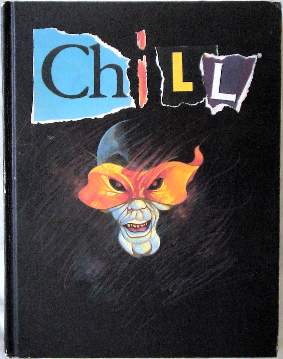
Chill’s 1990 second edition came at the edge of the era of “better rules”. Mayfair’s version of the game was a complete revision of the 1984 version from Pacesetter Games; the hardcover that I have barely hints that there even was an earlier version.
The Mayfair edition came out just after Shadowrun and just before Vampire, both of which combined would complete the shift away from “better rules” and towards “more interesting worlds”. Chill came with an organization to employ the player characters but little in the way of a world for them to live in. Unlike the earlier Call of Cthulhu, there were no specific rules to tie the game to a specific world-style.
Players built characters in Chill using Character Insight Points, in much the same way that players in Champions and GURPS created their characters. Besides Basic Abilities, they could purchase Skills, Edges, and Disciplines (psychic abilities), and increase their CIP pool by taking on Drawbacks.
Characters gained additional CIP during play. As in GURPS, basic abilities became more expensive to increase after play but skills and disciplines cost the same. There were no rules for acquiring new edges or drawbacks, or for getting rid of drawbacks.
Characters were awarded CIPs at the end of a play session “based on what the party accomplished that session.” If they lost ground, they might receive no CIPs, and a “death-defying conclusion to a multi-session scenario might call for 5 or more CIPs per character.”
Alternity
Alternity, published by TSR/Wizards of the Coast in 1998, was the last major effort from TSR before their financial problems caught up with them. It kept to the path created by D&D and followed by so many games that came after D&D in the previous decade. It tried to create better rules for a wide variety of campaigns. The introductory game was basic science fiction, but Gamma World was also converted to the Alternity rules.

As usual, “you don’t win this game by beating the other players.”
Individual players win when their heroes defeat foes, gain money, fame, and achievement points, and increase their personal power and reputations.
That’s what’s great about the Alternity game—each adventure is just one tale in the continuing saga of your hero characters. Each hero develops over time, getting better and better from one adventure to the next. Sure, you can have a great time just playing once, but the real excitement comes from watching the heroes improve and grow.
Characters received the most achievement points if they “completed the adventure and defeated the villains in spectacular fashion”. They received fewer achievement points if they completed the adventure but had problems, and if they failed completely, they received no achievement points.
Unlike most of its predecessors at TSR, Alternity did not use experience levels even in a diluted form. Achievement points were used to improve specific facets of the character’s capabilities directly. They were used to improve the character’s existing skills, to acquire new skills, to improve basic abilities, to improve the character’s ability to survive damaging events, and to improve their ability to act quickly in combat situations.
Summary
Most of these games were at least in part a reaction to D&D. Many of them even mentioned D&D directly, and many that did not mentioned “early games” or “that other game”.
Because realism and playability was the goal of these games, character advancement systems experienced a tug-of-war between easy systems and ones that tried to model real life. For those that looked to realism, time and money were often used to improve character capability. Some games chose to allow improvements only for capabilities used during the game.
Champions started a trend by tying creation costs directly to improvement costs. Later games took this idea and varied creation vs. improvement costs but still used the same basic system for both character creation and character improvement.
More gaming history
- The Cult of the Cult of Gygax™
- It was never a secret to us back in the day that the staff at TSR played the game themselves, and that they played the game with custom rules and custom worlds.
- Was table-top gaming inevitable?
- Gods & Monsters rolls an 18 for age today, pioneer game writer Greg Stafford died two weeks ago, and stories about the early days of gaming has me wondering, was the discovery of table-top gaming a perfect storm, or was it inevitable?
- Gary Gygax’s game
- Links around the net to people talking about Gygax.
- Poisoning the Magic Well: RPG Distribution
- Ron Edwards writes a short history of RPG distribution that’s fairly accurate to my recollection.
- The deep history of roleplaying
- Rob MacDougall talks about roleplaying before roleplaying.
- Six more pages with the topic gaming history, and other related pages
More rewards and experience
- Experience and Advancement in Role-Playing Games
- Kill monsters. Take their stuff. How has character advancement in role-playing games changed over the years? Starting with original D&D and on up through a handful of modern games, I’ll be surveying methods of experience and character advancement over the years.
- Rewards and improvement in Dungeons & Dragons
- Kill monsters. Take their stuff. How has character improvement in D&D changed over the years? This article in the RPG experience series looks at changes in experience point acquisition from early D&D through later versions of the game and later games by the authors.
- Experience in world-based role-playing games
- In the eighties and through the nineties, people started writing games where the world was more important than the rules. In theory, this should make for a different kind of character advancement as well.
- Experience in thematic role-playing games
- Thematic games combine a love of rules with a love of setting. In these metagames, the rules are the setting, and the setting is the rules. Further, acknowledging the rules makes it easier to remove them. Such games are usually acutely aware that character advancement is a reward encouraging the actions that incur the reward and which move the game towards a specific conclusion.
- Facets of character improvement rules
- Character advancement invariably rewards something, whether the reward comes for showing up for the game or doing certain kinds of things within the game. Role-playing games may not have winners and losers, but there are things to win. There are results worth fighting for.
- One more page with the topic rewards and experience, and other related pages

This is the second in a series surveying character advancement through the history of role-playing games since Dungeons & Dragons. The next article will survey world-based games such as Call of Cthulhu, Marvel Super Heroes, Shadowrun, and Vampire.